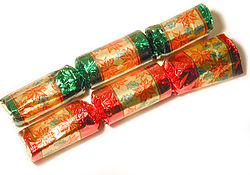Knut's party
A Knut's party or Knut's dance (Swedish: [julgransplundring] Error: {{Lang}}: text has italic markup (help), literally: "Christmas tree pludering") is a tradition in Sweden on St. Knut's Day (13 January). It means the end of the Christmas and holiday season. The Christmas and holiday season has then spanned across Advent Sunday, Saint Lucy's Day, Christmas, New Year and Epiphany. In private homes, especially children often have a party. They dance around the Christmas tree and smash the gingerbread house into pieces. The Christmas decorations are then put aside. Such parties are even common at schools, Kindergartens, churches and other associations. In many towns the public Christmas tree is taken out of usage for the bypassed Christmas by holding an outdoor Knut's dance.[1] The tradition originates from the Nordic region. It has changed very little since the 1870s.[2]
| Knut's party | |
|---|---|
 Christmas crackers are common during Christmas tree plunderings in Sweden. | |
| Official name | Julgransplundring |
| Observed by | Sweden |
| Date | 13 January |
| Celebrations | dancing around the Christmas tree, children's party, removing Christmas decorations |
| Related to | Christmas, St. Knut's Day |
References in popular culture
- The final verse of the 1901 Christmas song "Raska fötter springa tripp, tripp, tripp" describes the Christmas tree being carried out ("julegranen bäres ut"). It means that a Knut's party may specially emphasize the final verse. The song was written by Sigrid Sköldberg-Pettersson and Emmy Köhler.
- Astrid Lindgren has depicted traditional Swedish Knut's parties in her books. One example is "Pippi Longstocking's After-Christmas Party" from 1979.
- The 1984 Gunilla Bergström book "Klaga lagom, Alfons Åberg" (later called Lycklige Alfons Åberg) depicts no traditional Knut's dance. Instead the Christmas tree is thrown down from the flat balcony into the January snow. It can be seen as a modern variation for children in urbanized 20th century Sweden.
Knut's Party Media
References
- ↑ "Julgransplundring: Rocking around the Christmas Tree". Your Living City. 3 January 2014. Retrieved 13 January 2015.
- ↑ "Julgransplundring" (in Swedish). Fira jul. Archived from the original on 5 December 2012. Retrieved 20 December 2012.
{{cite web}}: CS1 maint: unrecognized language (link)
